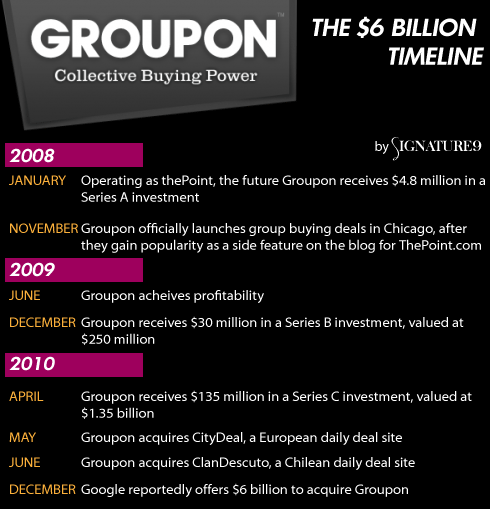Google’s $6 Billion Deal of the Day: Charting Groupon’s Astronomical Growth
When we first wrote about Groupon, it was a year-old startup where being a member was akin to being part of a small club. Today, it’s the subject of intense Google acquisition speculation, with the New York Times putting the purchase price between $5 and $6 billion.
With revenue estimates between $350-500 million per year, that makes the $5 to $6 billion estimates more likely than earlier reports of $2.5 billion. For context, in April of this year, Groupon was valued at $1.35 billion during an investment round. It’s hard for most entrepreneurs to wrap their head around that many zeros, and even for Google, this would be a big buy – it’s biggest ever, in fact. Still, judging by previous purchases, it’s not an unfair price. Consider that YouTube, which Google purchased for $1.65 billion, lost money on hosting costs for many years. While video advertisements are starting to pay off, it took a while. Google’s other big acquisition was DoubleClick, the ad serving company that powers advertising for a signifcant number of ad agencies, large brand advertisers and major publishers. Combined with AdSense, it gave Google the largest online advertising trafficking company and they got that for a mere $3.1 billion. {TechCrunch}
So what makes Groupon worth so much more? For starters, the company has shown potential for bringing in as much as $11 million in one day. That happened during a national promotion with the Gap, which may not be representative of daily income on smaller local deals, but is a good indication of the potential. Estimating an average daily revenue rate of $5 million and stagnant growth, Google would earn their investment back in roughly 3 years. Considering the $130 million investment in April looks poised to give investors a pretty serious return in just over 6 months, it may not even take that long. Groupon’s growth in short periods of time is nothing short of amazing.

Second, Groupon is one of the few companies with serious traction in the online to offline small business market. It’s estimated thatsmall business represent $100 billion in revenue, but centralizing their offerings and scaling them has proved difficult for many startups. There’s Yelp, but that deal fell apart, and Google was only offering $500 million for the popular directory. Marissa Mayer, a highly visible VP at Google recently left her role heading Search for one heading Location and Local Services. Having taken video and display, Google is obviously betting on local offerings as the next advertising market to conquer.
Finally, after Groupon’s own acquisition spree of copycat sites in Europe and South America that had started finding their own audiences, it’s probably a cheaper and safer bet for Google to buy their way into the local deal market than to try going after it on their own. While Google is a behemoth, Google Video never overtook YouTube, Froogle never overtook other shopping engines and Google Base never displaced Craigslist. When it comes to verticals, Google’s products don’t have the best track record when a competitor with a solid community is the opponent.
